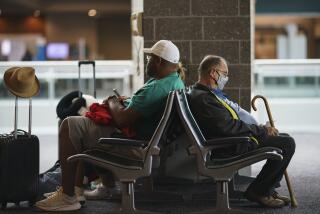Researcher Has Tips for Surviving Hijack Ordeal
- Share via
Despite the much-recorded drama of plane hijackings in recent years, statistics indicate that the chance of being caught in such a situation is very slim.
But what if you’re one of the unfortunate ones? What can you do, and conversely not do, to improve your prospects of coming through the ordeal as well as possible?
Here are some general guidelines from Thomas Tompkins, a consultant on terrorism for the Rand Corp., a Santa Monica-based research organization. Remember, hijackings vary greatly.
Keep Your Cool
Be as calm as possible. This can be very difficult, but keep in mind that despite some instances of fatalities, most passengers have not been hurt in hijackings. While no form of behavior can guarantee survival, the odds are that nothing bad--other than the physical and mental problems of the hijacking--will happen to you.
“If it’s any consolation, hijacked passengers--be it on planes, ships, buses, etc.--have the best chances compared to other kinds of hostage situations,” Tompkins said.
Do as you’re told. Unless you’re in a life-threatening situation, obey instructions. “If you’re told to move to a new seat, move.”
Keep a low profile. Don’t attract attention to yourself by speech, gesture or attitude. Avoid eye contact with hijackers if this can be accomplished without being obvious about it.
Stay in your seat. Don’t try to get up. And, most important, don’t try to be a hero. “Playing John Wayne or Rambo is more likely to make you the one they pick to make an example of, though you’re always subject to the luck of the draw,” Tompkins said.
Not attracting attention can even mean not raising your hand to go to the bathroom, no matter how severe the urge or unpleasant the consequences. “It can be a trade-off between being alive and soiled clothing.”
However, if you do have to go to the bathroom, or need other assistance, try to signal a member of the plane’s crew (if they are allowed free passage through the plane) or a hijacker. Request permission to stand and move. Don’t stand without the hijackers being prepared for this movement.
Avoid Movement
Similarly, it’s not prudent to start reaching into any flight bags you have around your seat (or in an overhead bin), without first making sure your movement is approved and anticipated. Unless you need something important, like medication, you might be better off waiting. “The point is to avoid any movement that could be construed as suspicious by nervous and armed terrorists,” Tompkins said.
Don’t initiate conversations with the hijackers, but respond if they talk to you. In that case, maintain eye contact. Don’t argue. Remember, though, that you’re a symbol more than a human being to hijackers. Accordingly, Tompkins advised: “If you have the opportunity to develop some rapport through a hijacker-initiated conversation, you can try to utilize this to re-establish that you’re a human being with all the concerns common to people round the world, such as family and children.
“Terrorists consider the passengers in a hijacking symbols and pawns, not people, to use toward their ends. If they are made to feel any sort of human connection or bond, that might make the difference in how you are handled. But if you make this your obvious objective it won’t work, and worse, it can backfire.”
Answer any questions hijackers ask you simply and to the point. But don’t volunteer extra information. You can try to make yourself seem less important than you are. Instead of saying you’re the president or vice president of a company, take on lesser responsibilities--but without getting caught in an obvious lie. Your business cards, if on your person or carry-on bags, would establish your real position.
On the subject of identification, considering that it might be open season on Americans, don’t try to hide your passport or pretend that it’s in your checked-through luggage, etc. Regardless of nationality, you’re supposed to have your passport with you, and this will be the hijacker’s expectation.
Be Careful With Lies
“It’s OK to lie, but only if you know you can get away with it,” Tompkins said. “Both you and your in-flight bags may be searched, and you’re also directing attention to yourself.”
Not only might American travelers be considered fair game these days, you may have two strikes against you if you’re Jewish. On this score, Tompkins said: “Try removing any ornamentation obviously identifying you as Jewish if you can do it surreptitiously. Put it in the glove pocket of the seat in front of you, in the folds of the seat, etc. But if you have a Jewish name on your passport, you’re out of luck. Some Jewish passengers now take off identifying ornamentation before some of their flights.”
If hijackers try to enlist your aid in creating propaganda, you have to play it by ear. How you behave under these difficult conditions is very much a matter of personal judgment. “If they pass around a manifesto for passengers to sign stating that ‘Reagan is a Great Satan’ or such, sign it. I would. People will realize that you signed under duress.”
As tempting and reassuring as it might be, be careful about engaging in conversation with other passengers (and don’t if you’re told not to). It’s possible to communicate without speaking. Take caution in what you do communicate, aloud or otherwise, in the sense of not giving the hijackers any cause to be suspicious. “Hijackers can be trigger-happy, and if they opt to make an example of someone, they’re more likely to select a passenger who has caught their eye for one reason or another.”
Similarly, don’t start taking notes, or passing around notes. “Both activities are sure to be noticed, possibly to your detriment.”
Make Yourself Comfortable
As the plane’s air conditioning and other controls may be turned off, make yourself as comfortable as possible. Loosen your tie if you haven’t already done so during the flight.
If your plane is assaulted by a counter-terrorist strike force, don’t try to help or cheer them on. “These people are trained to shoot on movement. If you’re in an aisle for any reason, hit the floor and don’t move. If you’re in your seat, bend over with your head on your legs and don’t move. Remain absolutely still until ordered to move.”
Tompkins said that in such situations you should anticipate the possibility of being treated roughly by a counter-terrorist force. “They’re concerned about terrorist sleepers, members of the hijacking group who stay posed as passengers to be alert to any passenger insurrection, etc. You’re considered a possible adversary until established as a bona fide passenger.”
Finally, stay alert to developments, and keep your hopes up. While statistics are cold comfort, 6.5 million Americans did go to Europe last year, according to one survey, and 10 of them were killed by terrorists. This is 1 in 650,000. The majority of flights are incident-free and, considering the vehicular mayhem on domestic highways, safety is a very relative subject.
More to Read
Sign up for The Wild
We’ll help you find the best places to hike, bike and run, as well as the perfect silent spots for meditation and yoga.
You may occasionally receive promotional content from the Los Angeles Times.






